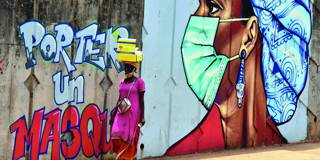By demonstrating that rapid, systemic change is possible, the COVID-19 pandemic has created an impetus for African governments to follow through on long-needed public-sector reforms. Only with improved governance and new thinking can the continent tap the massive latent potential of its population.
CONAKRY – Despite various perceived disadvantages, Africa has not been the disaster zone many feared it would be during the COVID-19 pandemic. The continent had certain natural advantages, such as a young population that is relatively less vulnerable to the virus. And owing to their experience with previous outbreaks, such as Ebola in 2014-16, many African governments were quick to act, locking down populations and closing borders to limit transmission.
The greater challenge has been economic, with many forecasters warning that the pandemic has increased extreme poverty and caused long-lasting social and economic damage in many countries. To meet these challenges – and to defy dire forecasts – African governments need to seize the unparalleled opportunity for public-sector reform that the crisis of the past two years has created.
The pandemic gave rise to practices that would have seemed impossible before, such as widespread remote work and education, and spurred new methods of health-care delivery and the unprecedently rapid development of vaccines. Suddenly, promising possibilities became new realities across Africa. Now, the same thing needs to happen to governance processes.

CONAKRY – Despite various perceived disadvantages, Africa has not been the disaster zone many feared it would be during the COVID-19 pandemic. The continent had certain natural advantages, such as a young population that is relatively less vulnerable to the virus. And owing to their experience with previous outbreaks, such as Ebola in 2014-16, many African governments were quick to act, locking down populations and closing borders to limit transmission.
The greater challenge has been economic, with many forecasters warning that the pandemic has increased extreme poverty and caused long-lasting social and economic damage in many countries. To meet these challenges – and to defy dire forecasts – African governments need to seize the unparalleled opportunity for public-sector reform that the crisis of the past two years has created.
The pandemic gave rise to practices that would have seemed impossible before, such as widespread remote work and education, and spurred new methods of health-care delivery and the unprecedently rapid development of vaccines. Suddenly, promising possibilities became new realities across Africa. Now, the same thing needs to happen to governance processes.